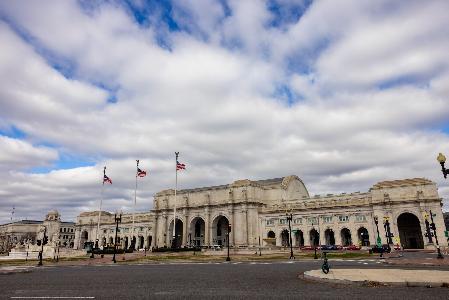Chicagoans aren’t known for talking about themselves.
As Comcast Vice President for External and Government Affairs Matthew Summy put it, “It prides itself as a city where people get things done.” But the city has been home to some influential tech developments.
Bungie, which created Xbox institution Halo, was based in Chicago until the company was acquired by Microsoft and moved to Seattle. There’s Groupon, of course, and its lofty IPO. Ruby on Rails grew out of work by Basecamp developer David Heinemeier Hansson, And Chicago native Adrian Holovaty was on the team that created Django, before he created chicagocrime.org (later EveryBlock).
According to The Starter League cofounder Neal Sales-Griffin, the company he founded was the first in-person coding academy of its kind when it was founded in 2011. He said the company is at the point where it’s time to start talking about it.
It is a community that is really bonded together.
“We’re so humble and midwestern, it’s not really in our DNA to brag about it too much,” said Sales-Griffin, who got involved in the city’s tech scene when he was a freshman at Northwestern University 10 years ago. “We just get back to work.”
As the tech scene becomes more important to Chicago’s wider economy and with efforts to retain and attract talent, talking about that work is becoming increasingly important for the rest of the community, too. Facilitating those conversations is a major aim of the Tomorrow Tour, a national event series produced by Technical.ly and sponsored by Comcast NBCUniversal.
The Tomorrow Tour will be in Chicago on March 8 for an evening of networking and discussion.
Register (free)For example, take one key ingredient for any thriving tech scene: major universities as an anchor resource for innovation and talent.
Chicago has a handful of higher-ed heavyweights, with Northwestern University, the University of Chicago, DePaul, the Illinois Institute of Technology and others in the city. Two hours south, the renowned computer science school at the University of Illinois Urbana-Champaign trained Larry Ellison of Oracle (who grew up in Chicago), PayPal cofounder Max Levchin, Yelp cofounder Russel Simmons and famed investor Marc Andreessen. They all left for Silicon Valley.
These days, members of the community are making direct connections to the universities, and showing students what already exists for entrepreneurs in Chicago.
People in Chicago are really open to new people who show up and want to become involved
The incubator 1871 looks to engage with student entrepreneurs in the city, as well as the University of Illinois. With a collective at Purdue University in Indiana, the Chicago-based female startup organization Ms. Tech is also looking to connect students with the city’s tech scene in other parts of the Midwest, said CEO Nicole Yeary.
“While before it was a flood, now it’s more of a trickle,” Fred Hoch, CEO of the Illinois Technology Association, said of entrepreneurs leaving. “It can be stopped if we make sure that the universities’ people here know that the companies are in Chicago that are solving big problems.”
Beyond individual companies, here are a few observations about the tech community that could help fill in the picture.
1. It’s diverse
As a whole, Chicago’s economy isn’t dominated by any one company, and that’s also true in tech.
Big companies like Groupon lead a group of companies in retail. There are also concentrations around fintech like PayPal-acquired Braintree, and data science, like IBM-acquired Cleversafe. Healthcare is another burgeoning area with Merge Healthcare (also acquired by IBM) and the startups at healthtech incubator Matter. B2B is a big overall focus, but there are also consumer-facing startups, and a new push in advanced manufacturing.
The wider economy also provides options for companies who stay and grow — with access to industry leaders and more than 30 Fortune 500 companies.
“The opportunities for scale are terrific, and proximate to you,” said Comcast’s Summy.
2. It’s focused on building
While it’s rare to find a tech scene as a whole that doesn’t think it would benefit from more early stage capital, bootstrapping has become part of the culture in Chicago’s tech scene. People in the community value startups that are profitable, and solve problems that help customers.
Take Carlos Currea, founder of community crowdfunding platform Loqalus. While majoring in political science at Illinois State, the Chicagoland native didn’t think of himself as an entrepreneur.
“When I thought of startups … I thought of people trying to think of the next big thing and trying to make a billion dollars. I was never into that,” he said.
But when he moved to Chicago, Currea worked on a social entrepreneurship startup and realized the potential for direct impact. As Currea looks to get feedback on the alpha version of Loqalus, he’ll look to the city’s neighborhoods to make sure the company is truly providing a need. He sees it as a great place for testing.
Through the failures and pivots that come with entrepreneurship, Chicago’s characteristic resilience also comes through. It’s right in the name of 1871, which is a nod to the innovation that defined the rebuilding of the city after the Great Chicago Fire of that year.
“You’re going to have to give up a little bit, if not a lot, to seek out what you’re creating,” said Yeary of Ms. Tech. “I think Chicago is the epitome of that.”
3. It’s accessible
Ms. Tech events and Chi Hack Night were go-to spots for Ellie Day when she began getting involved in the tech scene in 2014. From the weekly, civic-focused Chi Hack Night, Day got involved with mRelief, an all-female team that makes an app to help people determine if they are eligible for public benefits. At Ms. Tech, she talked to a founder of same-day delivery company, WeDeliver, which was acquired by Deliv last year.
“People in Chicago are really open to new people who show up and want to become involved,” said Day, a freelance web developer.
Starter League cofounder Sales-Griffin said 1871 made a huge difference in providing a gathering point and resources when it started, and Currea confirmed that in saying he met other entrepreneurs and mentors at events there.
For Ms. Tech, Yeary said the willingness to help others out is present in the organization’s roots as a Facebook group where women developers and designers connected and helped each other. The organization is now a partner at 1871, and Yeary is co-facilitator of the incubator’s recently launched WiSTEM program. As some of the companies have grown, they have taken additional space. But it’s within 1871, which recently expanded to another floor of the massive Merchandise Mart building. It’s a sign of the community’s growth, but no one wants to move too far away from the incubator.
“It is a community that is really bonded together,” said Yeary.
Join the conversation!
Find news, events, jobs and people who share your interests on Technical.ly's open community Slack

Delaware daily roundup: Equity Action Summit video; DE Senate debates wind energy; Hydrogen hub listening sessions

Philly daily roundup: Student-made college cost app; Central High is robotics world champ; Internet subsidy expiration looms

DC daily roundup: Appian's new AI tools; Foxtrot stores abruptly shutter; Sublime Security raises $20M


